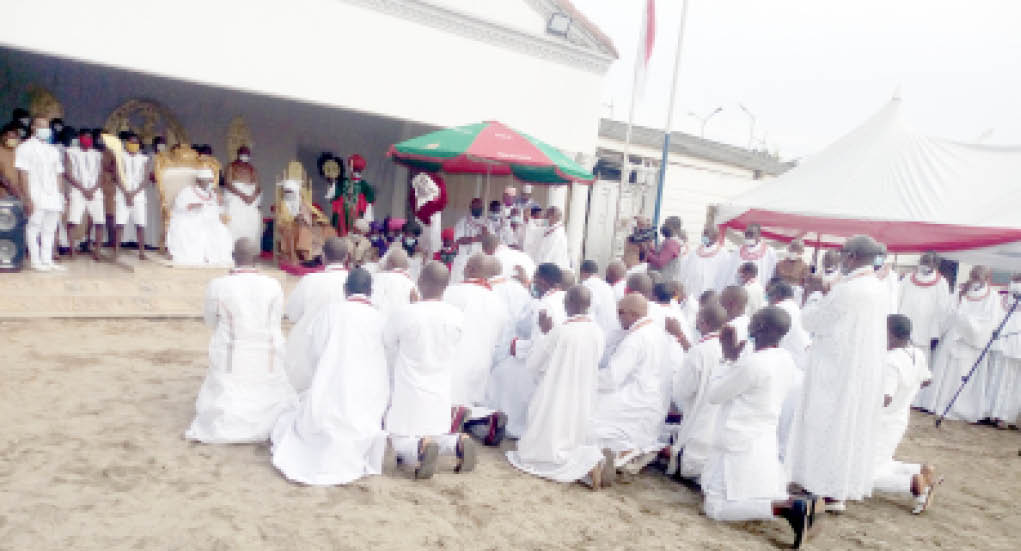The ‘subsidy’ on traditional rulers
The ongoing brouhaha between the Palace of the Oba of Benin and Edo State Governor Godwin Obaseki has once again brought to the fore the cost of subsidising traditional rulers considering their role and relevance in Nigeria. Quite mistakenly, Nigerian traditional rulers are labelled “royal fathers”, but in truth, most of them are not. In […]

Chiefs paying homage to Oba of Benin
The ongoing brouhaha between the Palace of the Oba of Benin and Edo State Governor Godwin Obaseki has once again brought to the fore the cost of subsidising traditional rulers considering their role and relevance in Nigeria. Quite mistakenly, Nigerian traditional rulers are labelled “royal fathers”, but in truth, most of them are not.
In common parlance, royalty are members of any family which reigns by hereditary right. The Oba of Benin is indeed one of the few traditional rulers who can be referred to as a royal father because he ascended to his throne by birth. In Edo State, there is an adage that chiefs are made but Kings are born! Titles are hereditary and the holder is neither selected nor appointed.
The majority of Nigerian traditional rulers are not “royal” because their titles aren’t hereditary and aren’t limited to a particular family. Furthermore, they are appointed, suspended or indeed removed by state governors. Royalty does not participate in governance or partisan politics and does not express preference for candidates or political parties, let alone agitate for a role in government.
When India became a nation in 1947 its six hundred traditional rulers known as Maharajas lost their royal grandeur and position. For thousands of years, they were the kings of the world welding despotic power from their peacock thrones, sitting on clothes of gold while their subjects suffered all manner of deprivations. After independence a stroke of the pen rendered Maharajas obsolete. They became out of work, ordinary citizens in a democratic state, lost their authority and reigned nowhere. Their palaces became hotels, museums, or schools and their sons had to think of how to make a living.
Subsidy removal: Lawan urges FG to cushion hardship
Plateau govt kicks as suspended chairmen resume office amidst security
In 1963 when Nigeria became a democratic republic, we got rid of the Queen of England but kept our traditional rulers. There is ongoing debate as to whether or not they should be accommodated within any new structure of governance, but the inescapable truth is that democracy is an irreversible wind of change and traditional rulership is a phase in the development of human society in which nations are supposed to progress beyond to inculcate true democracy.
Hereditary privilege is repugnant to democracy which is based on all men being equal before the law, being entitled to equal opportunities, and entitled to equality of reward for similar efforts. The First Republic constitution made provision for a House of Chiefs in each region into which members were nominated rather than elected. Problems arose when traditional rulers became aligned with political parties and cooperated in suppressing or intimidating opposition.
In 1966, the military removed “troublesome” traditional rulers from partisan politics and public administration and merged the Native Authority Police with the Federal Police and Prisons Service. In 1976 local government reforms legalized the removal of traditional rulers from party politics and created both local government councils and traditional councils.
The 1979 Constitution abolished the House of Chiefs and ever since, traditional rulers have been lobbying for constitutional amendments to create a role for them. They present a fallacious argument that the challenges facing the nation have been exacerbated by the marginalization of traditional rulers. The problem is that democracy does not allow for participation in governance by hereditary authority. Even worse “royal fathers” are re-writing history conveniently forgetting that they involved themselves in all sorts of nefarious activities. They sold fellow Nigerians to Arab, Portuguese and British slave traders.
In modern times, they involved themselves in kidnapping, ritual torture of suspects, and election rigging where ballot papers and result sheets were discovered in palaces. As a result, younger Nigerians have little respect for traditional rulers. There is a viral video of the former Rivers State Governor and current Minister for the Federal Capital Territory (FCT) Nyesome Wike publicly berating and insulting traditional rulers that most of them have very poor antecedents and contribute nothing positive to society but simply dress in fancy costumes and live a luxurious life at public expense.
In a democratic setting, it impinges upon human rights to confer powers upon unelected traditional rulers. Be that as it may, politicians still regard palaces as necessary stops on campaign trails to seek “blessings” known to be dispensed for a fee, and showered upon every candidate who can afford them! In the “good old days”, mature traditional rulers comported themselves with dignity.
These days, the younger generation has become social media sensations pictured dancing, marrying numerous wives, competing to see who owns the best Rolls Royce car, and trudging to Abuja for handouts from the Presidency. Of course, not all of them are unscrupulous and many of them concluded distinguished careers in the public sector before going on to become honoured traditional rulers.
Be that as it may, the mandate of state governors is superior to that of traditional rulers who at best preside over a couple of local governments. Constitutional monarchies such as Britain do not have local traditional rulers. The monarchy covers the whole land and has a role in opening parliament, swearing new prime ministers and being ambassador plenipotentiary for the nation.
Nigerian monarchs have no known function other than to preside over cultural occasions. With the current pervasive suffering in the land, removal of fuel subsidy and the atrocious cost of governance, it makes little sense for a democratic nation to be further pauperized by adding the burden of increasing subsidy on traditional rulers.
